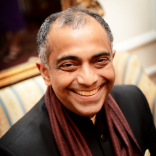Bio
Vijayendra (Biju) Rao, a Lead Economist in the Development Research Group of the World Bank, works at the intersection of scholarship and practice. He integrates his training in economics with theories and methods from anthropology, sociology and political science to study the social, cultural, and political context of extreme poverty in developing countries.
His research has spanned a variety of subjects. In his early work he pioneered empirical research in Economics on dowries, domestic violence, and sex work. His 2004 edited book with Mike Walton, Culture and Public Action, was an effort to instigate a conversation between anthropologists and economists to open up (then) new questions at the intersection of culture and development including the role of aspirations, inequality traps, and cultural heritage. He has had a long standing interest in Political Economy and democratic decentralization in India, his most recent co-authored work on this tests whether local democracy works better than than bureaucratic rule. He is a proponent of mixing qualitative and quantitative methods to make economics more reflexive, and to better understand and diagnose issues in development. His recent work has focused on participatory approaches to development, deliberative democracy, and voice and agency among the poor. He has been experimenting with the use of Natural Language Processing methods to understand epistemic discrimination in Indian village meetings, and to develop tools to analyze open-ended qualitative interviews at scale applying the method to study parents aspirations for their children, and to understand and measure well-being using narrative data. He has helped developed tools to allow ordinary citizens to conduct and analyze their own survey data for improved local planning.
He and Ghazala Mansuri co-authored Localizing Development: Does Participation Work?, and his most recent book, co-authored with Paromita Sanyal, is Oral Democracy: Deliberation in Indian Village Assemblies (Cambridge University Press). He is currently in the process of writing two books – the first, with Kripa Ananthpur and Radhika Viswanathan, tentatively titled “The Ordinary Business of Democracy” is an ethnography that tracks the political economy of ten village democracies in South India over a ten year period for Oxford University Press. The second is a short monograph with Shruti Majumdar and Paromita Sanyal for the WIDER/Cambridge University Press Elements Series, reporting on qualitative work conducted in four villages in Bihar over a four year period showing how a women’s self-help group project rapidly transformed gender relations and the challenges it faced when going to scale.
Rao obtained a BA in Economics from St. Xavier’s College, Bombay University, a PhD in Economics from the University of Pennsylvania, was a Hewlett post-doctoral fellow at the Economics Research Center and an Associate of the Committee on Southern Asian Studies at the University of Chicago. He held faculty appointments at the University of Michigan and Williams College, and was on sabbatical at Brown University, before joining the World Bank’s research department in 1999.
He is a Fellow of the International Economics Association, and the Chair of the Advisory Committee of the program on Boundaries, Membership and Belonging, at the Canadian Institute for Advanced Research.

